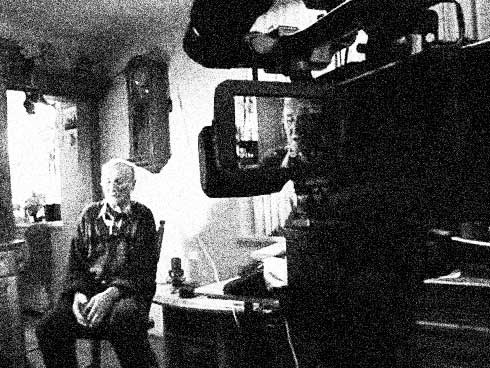Che cos'è ERA?
ERA è uno spazio in cui le storie individuali di persone, che in Europa hanno resistito al terrore, all'umiliazione e alla disperazione portati dal fascismo, sono mantenute vive e visibili a tutti.
Nei prossimi anni i protagonisti e i testimoni oculari scompariranno. Presto non ci saranno altre testimonianze degli avvenimenti oltre a quelle raccolte, registrate, raccontate e scritte. L'Archivio della Resistenza Europea consentirà di documentare questa preziosa conoscenza. La piattaforma offre la possibilità di ascoltare video interviste a donne e uomini che presero parte alla Resistenza antifascista. Nel progetto sono rappresentati sei paesi: Polonia, Slovenia, Austria, Francia, Italia e Germania.
Nella creazione della piattaforma un ruolo chiave è stato ricoperto dai giovani, che hanno partecipato attivamente alla realizzazione del progetto sotto forma di interviste. Nel loro lavoro sono stati guidati da storici, operatori della memoria e da un team video di professionisti. L’augurio è che questo contribuisca a creare una comprensione e un avvicinamento tra le diverse generazioni, e assicuri la consapevolezza di ciò che è stata a storia dell'Europa.
Obiettivi di ERA
L'Archivio della Resistenza Europea vuole mantenere viva la conoscenza della Resistenza e raccontare con quali mezzi le persone, decise a combattere contro il fascismo, l'occupazione e lo sterminio, contribuirono alla liberazione dal dominio nazionalsocialista.
L'obiettivo di ERA è quello di creare una comune consapevolezza del fatto che i diritti europei sono il risultato di un percorso storico, caratterizzato dalla lotta contro il fascismo e il nazismo. A tal proposito va riconosciuto il ruolo attivo che le donne ebbero nella lotta contro questi due regimi. Persone con diverse motivazioni politiche, sociali e religiose, guidate dalla propria coscienza, si ritrovarono a combattere nella Resistenza. ERA vuole creare e diffondere una consapevolezza europea del fatto che alla base della nuova Europa ci sia proprio la Resistenza contro il fascismo e il nazismo.
Nell’attuale narrazione storica della maggior parte dei paesi, soprattutto nei programmi scolastici, domina ancora una prospettiva nazionale. Vogliamo che ERA diventi un forum in cui le diverse prospettive nazionali si incontrino e portino a una comprensione della storia europea, nella quale la Resistenza contro il fascismo e il nazismo ebbe un ruolo costitutivo.
Partner del progetto ERA
DGB-Youth, Germany
The Youth organization of German trade unions consists of members of the youth working group of lecturers of the DGB. The lecturers regularly perform political youth work. This focuses on antiracist and antifascist subjects.
Youth Antifa Berlin, Germany
The antifa-youth group of Berlin is a group of young people being engaged in the struggle against fascism, racism, nationalism, anti-Semitism and sexism.
Karta, Poland
Eleven high-school students developed the ERA project in Poland. The project coordinator came from the House of Historical Meetings and Karta Center. The three witnesses, who were engaged in various forms of historical resistance movements in Poland in the years between 1939 and 1945 were interviewed by the students.
Istoreco, Italy
The Istoreco working group for the ERA project consists of an historian, a memory worker and a teacher as well as eight high school and university students. The junior team was provided with the necessary materials and tutoring in order to carry out the video interviews with the witnesses who all fought against the German occupation in the partisan movement.
Grünalternative Jugendorganisationen (GAJ), Austria
A mixed team of young people realized the interviews in Carinthia/Koroška. A professor for contemporary history at the University of Klagenfurt tutored them.
Institute of Contemporary History (INZ), Slovenia
The interviews in Slovenia were realized by a team from the Institute for Contemporary History in Slovenia. A group of young people tutored by a team of historians realized the interviews with former members of the Slovenian resistance against the Nazi occupation.
Province of Reggio Emilia, Italy
The Province of Reggio Emilia promotes a well-balanced social and economic development for its community and invests in research, knowledge and vocational training, the valorization of its landscapes, the local territorial and environmental development, the local welfare. It also promotes gender equality in every field and cares about the identity of its community through the memory of its inhabitants.
Forschungsgesellschaft Flucht und Migration, Germany
The Research Society Flight and Migration was founded in 1994. It does research and publishes facts about the situation of refugees and migrants on the periphery of the European Union as well as about the politics of separation and camps on the outer boarders of the European Union.
CEMEA, France
CEMEA was created in 1937 just after the Front Populaire (1936). CEMEA is a pedagogical organization which is historically related to the so called Education Populaire. The aim of CEMEA is to promote citizenship, equality of chances, social awareness and political involvement though education.
Pulse, Italy
PULSE is an Italian private Non-Profit Association founded in 2004 to promote and favor activities in different fields such as research, communication, education and training as well as international cooperation.


